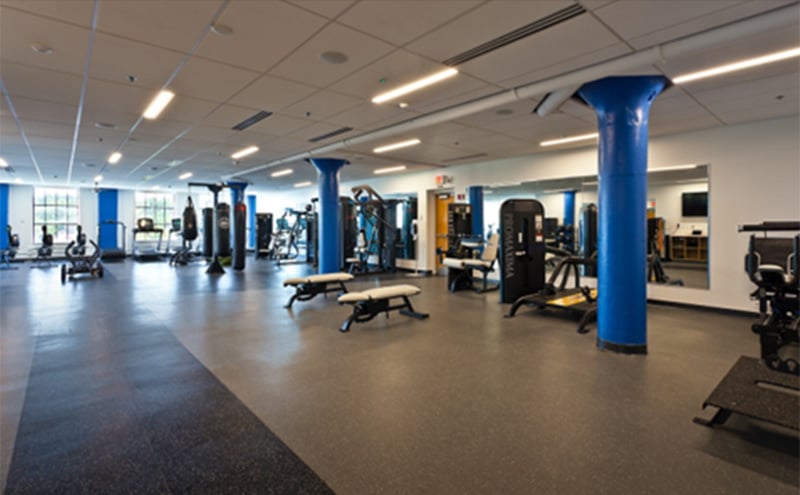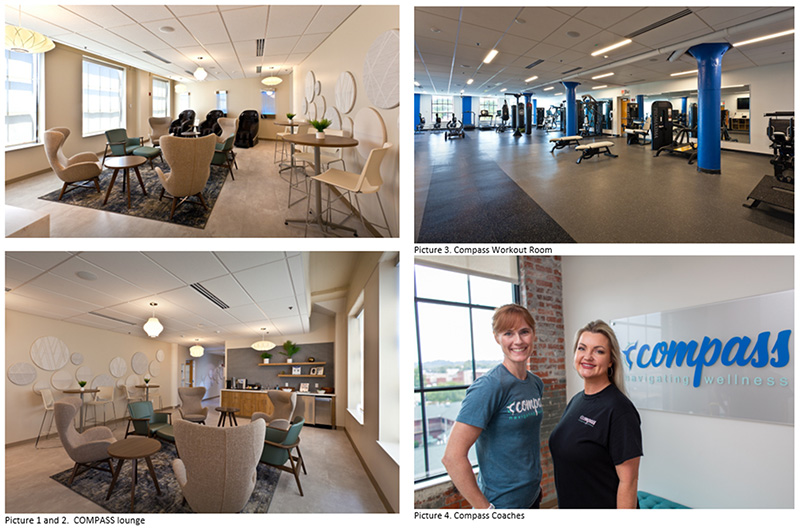
COMPASS Huntington: A Unique First Responder Wellness Center
Misuse of prescription opioids and heroin affects more than 2 million Americans. In West Virginia, opioid addiction has led to the highest rate of overdose-related deaths in the country -- leaving the next generation with grave concerns. In the City of Huntington, West Virginia, formally dubbed the "overdose capital of America," first responders were grappling with the shocking surge of drug overdose calls.
The term "compassion fatigue" was first identified by the City of Huntington when examining the scope and impact the opioid crisis had on the city's police and fire personnel. In turn, Huntington launched a program that aimed to address compassion fatigue by designing a program that provides first responders with tools ahead of time -- improving their ability to deal with high-stress situations in the moment, as well as strengthening one's resiliency to process any effects of that stress. COMPASS soon emerged as a winner of the Bloomberg U.S. Mayors Challenge, a yearlong competition that challenges city leaders to uncover and test bold, inventive ideas to confront the toughest problems faced by cities today. With monetary support from Bloomberg Philanthropies, the COMPASS program was launched with the intended purpose of improving the health, humanity, performance, and leadership of the police and fire personnel within the City of Huntington.
The COMPASS program is unique because it consistently utilizes feedback loops between program staff and first responders. The purpose of this process is to assure the program fulfills its mission by identifying evolving challenges facing the first responder community and modifying the program in real-time. Based on this process, the program identified two major pivots that were vital to its success: 1) the introduction of an integrated wellness center; 2) broadening the scope of the program to encompass other forms of occupational stress and trauma.

Creating a brick-and-mortar, integrated wellness center was not part of the original grant application. In turn, the COMPASS team embarked on an aggressive fundraising campaign, soliciting donations from philanthropic organizations and private donors. In 2021, the COMPASS Center opened its doors to first responders. The Compass Center is located on the fifth floor of the Huntington Police Department. Although the center was not originally part of the Compass plan, it was decided that a central location to house the Compass coaches and offer a place for overall first responder wellness would be ideal. The center comprises several areas targeted to various aspects of wellness. There is a wellness lounge for first responders to grab a coffee or snack, or relax in a massage chair; a workout facility that has a combination of multi-body lifting machines, functional equipment such as plyometric boxes, medicine balls, battle ropes and sandbags, as well as a multitude of cardio equipment. A studio room for yoga and jujitsu classes is located just off the workout center area, a meditation room for mindfulness work, and an occupational health room for holistic services that include chiropractic services, massage therapy, body tempering, and general health screenings. A learning kitchen is also available with capabilities to host meal prep classes and luncheons. In addition, the Compass coaches have offices in the center, allowing them constant access to first responders through walk-in sessions or scheduled appointments. Beyond services provided in the Center, the Compass Program also offers activities for first responder families and educational trainings such as financial planning and mindfulness classes.
Throughout the program implementation, Compass has experienced successes and challenges. The program has two coaches, Mental Fitness Coach Amy Jefferson and Physical Fitness Coach Amy Hanshaw were tasked with getting to know the first responders and gaining buy-in which was a challenge. They spent many months going on ride-alongs with HPD and visiting fire stations. We were successful in embedding the coaches into both departments, helped form relationships on the first responder’s turf, and helped earn trust.
Creating policy and successfully implementing them within each department was a challenge and a success as well. If HPD and HFD were to truly utilize Compass, it needed to be a part of each department and the policies needed to reflect the program being a priority. Critical incident polices were developed to include a Mental Fitness Coach to help normalize discussing traumatic events. A “one hour of Wellness” policy was also created for HFD, so they could visit the Compass Center while on shift, helping to drive participation in the program during HFD’s 24-hour shift.
Although the original intent of COMPASS program had been to respond to the challenges that faced police and fire personnel related to the opioid crisis, feedback received from first responders indicated that occupational stress and trauma comes from a multitude of sources: COVID-19, civil unrest, workplace culture, and media portrayal -- just to name a few. In turn, to fulfill its mission of improving the health, humanity, performance, and leadership of first responders -- COMPASS needed to broaden its focus, providing first responders with the training and resources necessary to tackle occupational stress and trauma, no matter what form it may manifest itself.
COMPASS utilizes a plethora of tools to enhance the health, humanity, performance, and leadership of police and fire personnel: embedded wellness coaches, educational training, the integrated wellness center, family activities, occupational health services, and revisions to department policies that prioritize health and wellness. COMPASS aims to become a proven, replicable solution to addressing occupational stress and trauma in the workplace. Once a quarter, the COMPASS program measures impact through a voluntary survey that measures health and well-being across the departments. Tentative data related to the program's impact reflects that police and fire personnel who utilize COMPASS experience a job satisfactory level two-times higher than nonparticipants. Likewise, program participants have seen an increase in soft skills, like resiliency and adaptability, of more than 26%.



